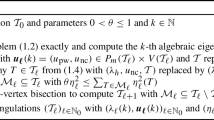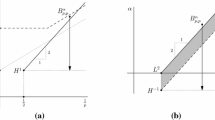Abstract
We investigate the decay rate for an adaptive finite element discretization of a second order linear, symmetric, elliptic PDE. We allow for any kind of estimator that is locally equivalent to the standard residual estimator. This includes in particular hierarchical estimators, estimators based on the solution of local problems, estimators based on local averaging, equilibrated residual estimators, the ZZ-estimator, etc. The adaptive method selects elements for refinement with Dörfler marking and performs a minimal refinement in that no interior node property is needed. Based on the local equivalence to the residual estimator we prove an error reduction property. In combination with minimal Dörfler marking this yields an optimal decay rate in terms of degrees of freedom.
Similar content being viewed by others
References
Ainsworth M., Oden J.T.: A posteriori error estimation in finite element analysis. Wiley-Interscience, New York (2000)
Bänsch E.: Local mesh refinement in 2 and 3 dimensions. IMPACT Comput. Sci. Eng. 3, 181–191 (1991)
Binev P., Dahmen W., DeVore R.: Adaptive finite element methods with convergence rates. Numer. Math. 97, 219–268 (2004)
Binev P., Dahmen W., DeVore R., Petrushev P.: Approximation classes for adaptive methods. Serdica Math. J. 28(4), 391–416 (2002) Dedicated to the memory of Vassil Popov on the occasion of his 60th birthday. MRMR1965238 (2004b:65176)
Bornemann F.A., Erdmann B., Kornhuber R.: A posteriori error estimates for elliptic problems in two and three space dimensions. SIAM J. Numer. Anal. 33(3), 1188–1204 (1996)
Braess D., Pillwein V., Schöberl J.: Equilibrated residual error estimates are p-robust. Comput. Methods Appl. Mech. Eng. 198(13–14), 1189–1197 (2009)
Bangerth, W., Rannacher, R.: Adaptive finite element methods for differential equations. In: Lectures in Mathematics, ETH Zürich. Birkhäuser, Basel (2003)
Braess, D.: Finite Elements, 3rd edn. Cambridge University Press, Cambridge (2007). Theory, fast solvers, and applications in elasticity theory. Translated from German by Larry L. Schumaker
Babuška, I., Strouboulis, T.: The finite element method and its reliability. In: Numerical Mathematics and Scientific Computation. The Clarendon Press, New York (2001)
Braess D., Schöberl J.: Equilibrated residual error estimator for edge elements. Math. Comput. 77(262), 651–672 (2008)
Bernardi C., Verfürth R.: Adaptive finite element methods for elliptic equations with non-smooth coefficients. Numer. Math. 85(4), 579–608 (2000)
Carstensen C., Bartels S.: Each averaging technique yields reliable a posteriori error control in FEM on unstructured grids. Part I: low order conforming, nonconforming, and mixed FEM. Math. Comput. 71, 945–969 (2002)
Chen Z., Feng J.: An adaptive finite element algorithm with reliable and efficient error control for linear parabolic problems. Math. Comput. 73, 1167–1193 (2004)
Cascón J.M., Kreuzer C., Nochetto R.H., Siebert K.G.: Quasi-optimal convergence rate for an adaptive finite element method. SIAM J. Numer. Anal. 46(5), 2524–2550 (2008)
Clément P.: Approximation by finite element functions using local regularization. RAIRO 9, 77–84 (1975)
Diening L., Kreuzer Ch.: Convergence of an adaptive finite element method for the p-Laplacian equation. SIAM J. Numer. Anal. 46(2), 614–638 (2008)
Dörfler W., Nochetto R.H.: Small data oscillation implies the saturation assumption. Numer. Math. 91(1), 1–12 (2002)
Dörfler W.: A convergent adaptive algorithm for Poisson’s equation. SIAM J. Numer. Anal. 33, 1106–1124 (1996)
Gilbarg, D., Trudinger, N.S.: Elliptic partial differential equations of second order. In: Classics in Mathematics. Springer, New York (2001)
Kossaczký I.: A recursive approach to local mesh refinement in two and three dimensions. J. Comput. Appl. Math. 55, 275–288 (1994)
Maubach J.M.: Local bisection refinement for n-simplicial grids generated by reflection. SIAM J. Sci. Comput. 16, 210–227 (1995)
Mekchay K., Nochetto R.H.: Convergence of adaptive finite element methods for general second order linear elliptic PDEs. SIAM J. Numer. Anal. 43(5), 1803–1827 (2005)
Morin P., Nochetto R.H., Siebert K.G.: Data oscillation and convergence of adaptive FEM. SIAM J. Numer. Anal. 38, 466–488 (2000)
Morin P., Nochetto R.H., Siebert K.G.: Convergence of adaptive finite element methods. SIAM Rev. 44, 631–658 (2002)
Morin P., Nochetto R.H., Siebert K.G.: Local problems on stars: a posteriori error estimators, convergence, and performance. Math. Comput. 72, 1067–1097 (2003)
Morin P., Siebert K.G., Veeser A.: A basic convergence result for conforming adaptive finite elements. Math. Models Methods Appl. 18, 707–737 (2008)
Nochetto R.H., Siebert K.G., Veeser A.: Theory of adaptive finite element methods: an introduction. In: DeVore, R.A., Kunoth, A. (eds) Multiscale, Nonlinear and Adaptive Approximation, pp. 409–542. Springer, New York (2009)
Petzoldt, M.: Regularity and error estimators for elliptic equations with discontinuous coefficients. Ph.D. thesis, FU Berlin (2001)
Petzoldt M.: A posteriori error estimators for elliptic equations with discontinuous coefficients. Adv. Comput. Math. 16, 47–75 (2002)
Prager W., Synge J.L.: Approximations in elasticity based on the concept of function space. Quart. Appl. Math. 5, 241–269 (1947)
Siebert, K.G.: A convergence proof for adaptive finite elements without lower bound. IMA J. Numer. Anal. doi:10.1093/imanum/drq001 (published online) (2010, May)
Schmidt, A., Siebert, K.G.: Design of adaptive finite element software. The finite element toolbox ALBERTA. In: Lecture Notes in Computational Science and Engineering, vol. 42. Springer, New York (2005)
Stevenson R.: Optimality of a standard adaptive finite element method. Found. Comput. Math. 7(2), 245–269 (2007)
Stevenson R.: The completion of locally refined simplicial partitions created by bisection. Math. Comput. 77(261), 227–241 (2008)
Siebert K.G., Veeser A.: A unilaterally constrained quadratic minimization with adaptive finite elements. SIAM J. Optim. 18(1), 260–289 (2007)
Scott L.R., Zhang S.: Finite element interpolation of nonsmooth functions satisfying boundary conditions. Math. Comput. 54(190), 483–493 (1990)
Traxler C.T.: An algorithm for adaptive mesh refinement in n dimensions. Computing 59, 115–137 (1997)
Veeser A.: Convergent adaptive finite elements for the nonlinear Laplacian. Numer. Math. 92(4), 743–770 (2002)
Verfürth, R.: A review of a posteriori error estimation and adaptive mesh-refinement techniques. Adv. Numer. Math. John Wiley, Chichester (1996)
Verfürth R.: Robust a posteriori error estimators for a singularly perturbed reaction-diffusion equation. Numer. Math. 78(3), 479–493 (1998)
Veeser, A., Verfürth, R.: Explicit upper bounds for dual norms of residuals. SIAM J. Numer. Anal. (2009, to appear)
Zienkiewicz O.C., Zhu J.Z.: A simple error estimator and adaptive procedure for practical engineering analysis. Int. J. Numer. Methods Eng. 24, 337–357 (1987)
Author information
Authors and Affiliations
Corresponding author
Rights and permissions
About this article
Cite this article
Kreuzer, C., Siebert, K.G. Decay rates of adaptive finite elements with Dörfler marking. Numer. Math. 117, 679–716 (2011). https://doi.org/10.1007/s00211-010-0324-5
Received:
Revised:
Published:
Issue Date:
DOI: https://doi.org/10.1007/s00211-010-0324-5




